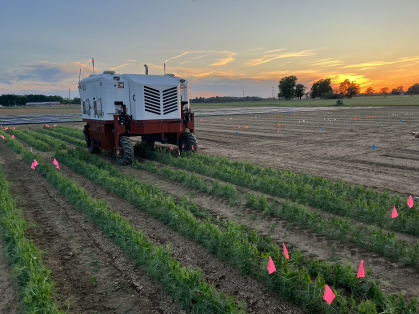Artificial Intelligence-guided technology could replace herbicides on East Coast farms
Imagine a tractor-size machine that can tell the difference between a vegetable and a weed - and then zaps the unwelcome plant with a laser.
It's not science fiction. It's being tested in New Jersey by Rutgers University scientist Thierry Besançon.

An associate professor with the Department of Plant Biology in the School of Environmental and Biological Sciences, Besançon recently collaborated on field trials of the high-tech device that uses artificial intelligence and lasers to kill weeds without using chemicals.
"It's pure physics," he said. "There's no herbicide involved. It's just light energy targeting the weeds."
Results of the field tests, conducted as the first peer-reviewed study of artificial intelligence-guided laser weeding on the East Coast, were published in the research journal Pest Management Science.
Early results are promising: The machine at the heart of the technology performed as well as conventional herbicides in controlling weeds and, in some cases, helped crops grow even better, said Besançon, a weed science specialist and the corresponding author of the study.
The laser weeder's promise is especially relevant in New Jersey, where small farms and specialty crops such as spinach, greens and herbs dominate, scientists said. Many of these crops have few or no approved herbicides, leaving growers with limited options.
The experiments used a demonstration unit from Carbon Robotics, a Seattle company pioneering the technology. The machine employs high-resolution cameras and deep learning algorithms to distinguish crops from weeds in real time, then obliterates the unwanted plants with pinpoint laser beams.
The trials were conducted in the spring and summer of 2024 in partnership with Lynn Sosnoskie, an assistant professor with the School of Integrative Plant Science at Cornell University. In New Jersey, research took place at the Rutgers Agricultural Research and Extension Center in Upper Deerfield near Bridgeton, a key site for vegetable crop studies in the state. Researchers tested the laser weeder on spinach, pea and beet crops.
The field trials in New Jersey were supported by the Vegetable Growers Association of New Jersey, as well as the Rutgers New Jersey Agricultural Experiment Station.
A close-up view shows the undercarriage of the laser weeder as it zaps weeds with light energy. Video by Thierry Besançon
The significance of the trials hasn't gone unnoticed. In an editorial published in the journal Pest Management Science, Stephen O. Duke, a veteran weed scientist at the University of Mississippi, called the research "potentially transformative" and compared it to one of the most important agricultural innovations of the past half-century.
"Not since glyphosate-resistant crops were introduced have I been as impressed with a new technology," wrote Duke, referring to products such as Roundup-ready soybeans. The variety is genetically engineered so it's not affected by the commonly used herbicide, Roundup.
He praised the Rutgers-Cornell study for providing "convincing evidence that the technology of artificial intelligence-guided lasers may soon revolutionize weed control in the developed world."
Although operated by a trained technician and not fully autonomous, the machine is a crack shot.
"We had weeds growing just half a centimeter from the crop seedlings," Besançon said. "And there was no laser damage to the crops. It's extremely precise."

One New Jersey grower who produces parsley, cilantro and dill mentioned interest in purchasing a commercial laser weeder, based on the Rutgers field trials.
"He told me, 'I don't have any other options,'" Besançon said. "There's no chemical solution for these crops, so this is his best choice."
Challenges remain. The machine is expensive, with prices starting around $500,000. The approach works best on short season crops and requires multiple passes during the growing season, especially in the wetter East Coast climate where weeds emerge more frequently. It also works best when weeds are small, so farmers need to monitor their fields closely and act quickly.
"You can't wait too long," Besançon said. "If the weeds get too big, the laser needs more energy and slows down."
Despite these limitations, Besançon said the technology will improve.
"They're already working on faster, more efficient versions," he said. "Eventually, you might be able to drive the machine at five miles per hour instead of one or two."
The benefits are clear, Besançon added. The laser weeder eliminates the need for herbicides, reducing chemical exposure for workers, consumers and the environment. It also sidesteps the rising problem of herbicide-resistant weeds such as Palmer amaranth, which has become a major concern in New Jersey and New York.
"With this, we are using photons for weed control," said Besançon, alluding to the fundamental particles powering lasers. "It's not just a new tool - it's a new way of thinking about how we manage weeds."
A view of the laser weeder during field trials at the Rutgers Agricultural Research and Extension Center in Upper Deerfield near Bridgeton, N.J. Video by Thierry Besançon
As the technology matures and becomes more affordable, Besançon said it could transform weed management, especially for organic and specialty crop growers.
"It's moving fast," he said.
The use of AI-guided machines equipped with carbon dioxide lasers and cameras already is gaining traction among West Coast farmers as a high-tech, eco-friendly alternative to herbicides
Besançon said he sees great opportunities for farmers on the East Coast and beyond to employ laser weeders as an important way to protect the environment.
"We're talking about our food supply," he said. "We need to grow vegetables like peas, beets and spinach, and we need better ways to control weeds without harming the crops or the planet."
Besançon said he never imagined he would be working with lasers in the field.
"Ten years ago, I would not have believed it," he said. "But here we are. It's exciting, and it's just the beginning."
Wesley Bouchelle, a technician at the New Jersey Agricultural Experiment Station's Philip E. Marucci Center for Blueberry & Cranberry Research, contributed to the study. Co-author Lynn Sosnoskie led the Cornell University research team.
Explore more of the ways Rutgers research is shaping the future.






